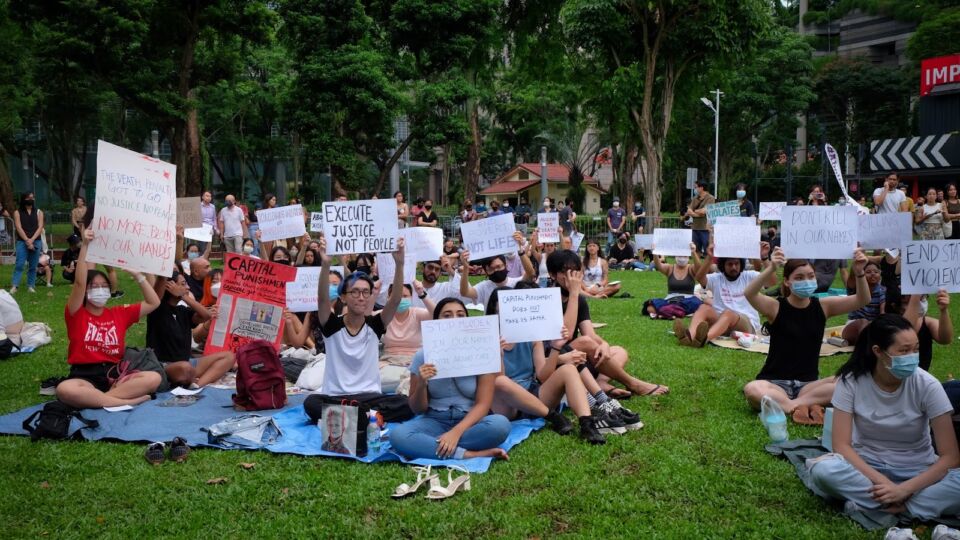Some have hoped that Malaysia’s move to abolish the mandatory death penalty last week would put pressure on Singapore to soften its notoriously hardline stance on capital punishment.
But Kirsten Han, a journalist and member of the Transformative Justice Collective (TJC), a Singapore justice reform advocacy group, has fought against the city-state’s use of the death penalty long enough to predict the Singaporean government’s likely response.
Han told Coconuts shortly after Malaysia passed a bill to make the death penalty optional and not mandatory, that while she was happy about its passage, she didn’t think Singapore will follow suit anytime soon.
“I’m not optimistic that this will affect the Singapore government’s stance on the death penalty in the short-term,” she wrote. “I don’t think the government would be willing to cede this position easily just because Malaysia has abolished the mandatory death penalty.”
The details about the death penalty Singapore doesn’t want to talk about
TJC, which advocates for death row inmates in Singapore, the vast majority of whom face the noose for drug-related offenses, has been vocal about criticizing the country’s mandatory death penalty policy as well as the lack of transparency and responsiveness from the government.
In February, the Singaporean government released a statement, confirming earlier reporting from TJC, that the state had executed 11 inmates in 2022, all for drug related offenses.
Malaysia’s decision to no longer mandate the use of the death penalty for certain offenses came after Ramkarpal Singh, deputy minister in the Prime Minister’s Department (Law and Institutional Reforms) said that capital punishment has “not brought the results it was intended to bring” and that the judiciary should exercise discretion fairly instead.
‘People lead free lives. What do you want to change of that?’ – Shanmugam
Han’s prediction about the impact of Malaysia’s bill proved to be correct. On Saturday, Minister for Home Affairs and Law K. Shanmugam told South China Morning Post in an interview that Singapore’s draconian drug laws are here to stay.
The newspaper asked Shanmugam if Malaysia’s move to soften its death penalty policy would have any implications on Singapore’s use of capital punishment. Unsurprisingly, Shanmugam said he stood by the government’s decision to keep Singapore drug-free.
In a lengthy response, Shanmugam first brought up countries with liberal drug policies such as Belgium and Netherlands, which he argued were having trouble controlling drug related offenses. He said lower-income citizens suffer the most as they are usually the ones who die or resort to drug trafficking.
“The killings, the destruction of lives, the loss of potential of a huge number – these are the day-to-day realities for so many people. You talk about inequality. Who do you think suffers most out of this?” he said.
Shanmugam then said they have an “extremely strong” support for Singapore’s anti-drug policies and the work of the Central Narcotics Bureau.
The home minister also praised the government for the way it has handled the controversy over the death penalty and the frequency with which it educates the public on the righteousness of their stance (something that Shanmugam himself engages in often in his frequent media appearances).
“What I can tell you is that today, there is strong support. Partly because we handle this carefully, and secondly, because we explain our position repeatedly to the public, so the public understands,” he said.
Shanmugan also argued that keeping drug laws strong allowed the government to distinguish between traffickers and abusers.
Traffickers are dealt with most harshly, mandating capital punishment for those convicted of carrying more than 500 grams of cannabis or more than 15 grams of heroin, among others.
Shanmugam said over 70% of people in the region where Singapore’s traffickers come from understand the country’s hardline laws and that it’s a huge deterrence to them. He went on to say that abusers are not treated as criminals and are instead sent for rehabilitation and are not given criminal records.
Activists argue that Singapore’s rehabilitation programs are punitive and lead some participants to become ostracized from society. Some death row inmates were convicted of trafficking after having gone through the state’s rehabilitation program multiple times.
Malaysia’s softening of its death penalty policy would only create more challenges, Shanmugam said.
“Anything that makes drugs more easily available will become more challenging,” he said.
“[T]he police presence and Central Narcotics Bureau’s presence is not that heavy. And, people lead free lives. What do you want to change of that?” he added.
The Singapore government, Shanmugam included, has been selectively vocal about defending strict drug laws, mainly debating on international news such as BBC and challenging international public figures such as billionaire and anti-death penalty activist Richard Branson (who turned down Shanmugam’s personal challenge to debate).
However, even before the announcement in Malaysia, the government has not made any attempts to engage in meaningful discussions with local reform groups such as TJC, despite the activists’ efforts to reach out to the government to voice their concerns.
Besides Malaysia, a number of other countries in the region have reduced their use of the death penalty and softened their hardline drug policies. Indonesia has had a moratorium on the death penalty since 2017 and Thailand famously decriminalized the use and sale of marijuana last year, following in the policy footsteps of many Western countries such as the United States.
But it seems, for the time being at least, Singapore shall remain steadfast in its belief that the best way to protect its people from the scourge of drugs is the threat of death.
Other stories you should check out:




